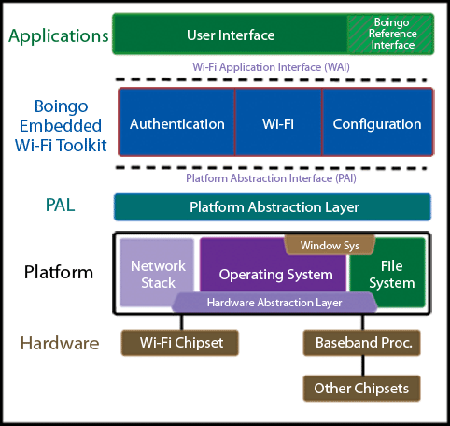Major hotspot operator open-sources config tools
May 17, 2006 — by LinuxDevices Staff — from the LinuxDevices Archive — 18 viewsThe largest aggregated WiFi hotspot network operator has released a collection of tools under open source licenses. Boingo Wireless hopes device makers targeting Linux, Windows Mobile, and BREW handsets and other mobile devices will use the tools to streamline device use with its Boingo Roaming System, comprised of 45,631 hotspots.
The release enables handset vendors to add Boingo connection utilities to their devices without incurring a license fee. These utilities are modular, to simplify porting, and represent a “complete solution” that can handle network detection, connection, authentication, log out, and disconnect, Boingo says.
Boingo CTO Niels Jonker stated, “Our open source code base allows the development community to self-manage the process of making their products eminently more usable in public Wi-Fi spaces.”

Boingo's Embedded Wi-Fi Toolkit architecture
Other claimed tool features include “power-saving logic” aimed at “recognizing known signals to minimize unnecessary connections,” and support for remote provisioning, for carriers wishing to implement WiFi access as an add-on service.
Specific releases comprise:
- Boingo Application Layer — Apache license
- Boingo Platform Abstraction Layer — Apache license
- Boingo Embedded Wi-Fi Toolkit — LGPL license
The Application Layer and Platform Abstraction Layers are licensed under the Apache 2.0 open source license, which does not require republishing modifications back to the open source community. This allows hardware manufacturers to retain the proprietary nature of their hardware interfaces and GUI frameworks, Boingo says.
The toolkit module is available under the Lesser General Public License (LGPL), which does require modifications to be shared.
Boingo will continue to license its tools and utilities commercially, for handset vendors or service providers wishing to add proprietary features unique to their devices, or that require a closed source option, it says. Potential customers include mobile operators and MVNOs (mobile virtual network operators), VoIP (voice-over-IP) providers, and “other service providers that can benefit from WiFi access in public places,” according to the company.
Linux WiFi driver specialist DeviceScape, which recently contributed a WiFI chipset driver framework to the Linux kernel project, has endorsed the Boingo release. DeviceScape's VP of Marketing, Glenn Flinchbaugh, commented, “This contribution combined with Devicescape's recent Advanced Datapath Driver contribution will continue to drive the proliferation of service-enabled devices that share entertainment and information wirelessly.”
Boingo says its tools have already been licensed by several partners, including Accton, Broadcom, E28, and Kyocera Wireless. Linux smartphone pioneer E28 has created the first implementation targeting specific Linux-based handsets.
E28's implementation
 E28 shipped the first Linux smartphone, in 2003, and has also produced some of the first dual-mode capable phone designs, such as the “Rainbow” slider model pictured at right.
E28 shipped the first Linux smartphone, in 2003, and has also produced some of the first dual-mode capable phone designs, such as the “Rainbow” slider model pictured at right.
E28 licensed the Boingo tools under an open source license, and its implementation of Boingo connection software for its OMAP-based dual-mode phones will be available before the end of May, from the BoingoWiFi sourceforge project. E28 says its implementation enables its dual-mode handsets to “seamlessly and transparently authenticate” at Boingo broadband WiFi hot spots in hotels, airports, convention centers, truck stops, and retail stores around the world.
Michael Chu, chief software architect at E28, stated, “As a leading proponent of Linux for handsets, we believe strongly in the open source model. Boingo's toolkit made it easy to add in market-leading Wi-Fi connectivity features that will give our dual-mode handset users the ability to benefit from low-cost VoIP services while in a hot spot.”
Jonathan Mendelson, director of business development for devices at Boingo, stated, “Consumers worldwide will soon be taking advantage of innovative and cost-saving communications options thanks to forward-thinking companies like E28. With this software now available to other developers, the Linux world is free to envision new ways of incorporating public access Wi-Fi in portable devices.”
Boingo CEO Dave Hagan added, “Whether capitalizing on the broadband speeds of a Wi-Fi hot spot for streaming video, VoIP calls, multi-player gaming, uploading vacation photos or downloading music from online stores, users will now be able to extract maximum value from their devices whether they're at home, in the office, or in tens of thousands of Boingo hot spots around the world.”
Availability
The Boingo tools are available now from the BoingoWiFi sourceforge project. Additional documentation is available from Boingo's embedded website.
This article was originally published on LinuxDevices.com and has been donated to the open source community by QuinStreet Inc. Please visit LinuxToday.com for up-to-date news and articles about Linux and open source.